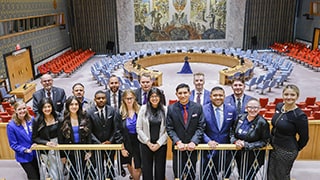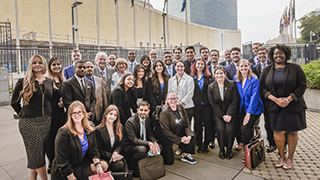Reflecting on the UN Summer Intensive Program
Thursday, June 29, 2023
 For the past 23 years, the School of Diplomacy and International Relations has hosted
an intensive summer program focusing on the United Nations (UN). For five days, students
meet with ambassadors and diplomats who represent their countries at the UN, international
civil servants who work at the UN, members of the UN Foundation, nongovernmental organizations
(NGOs), and private sector industries. Because of the Covid-19 pandemic, the last
three years ran entirely virtual, but this year, Dean Courtney Smith and Mr. Troy
Wolfe, Senior Director of Partnerships & Special Initiatives at the United Nations
Foundation /United Nations Association of the United States of America once again
took students to the United Nations from June 5 to June 9 for five days of immersive
seminars and meetings. This year's cohort comprised of 32 students, of which 18 are
from Seton Hall in either the graduate or the undergraduate programs.
For the past 23 years, the School of Diplomacy and International Relations has hosted
an intensive summer program focusing on the United Nations (UN). For five days, students
meet with ambassadors and diplomats who represent their countries at the UN, international
civil servants who work at the UN, members of the UN Foundation, nongovernmental organizations
(NGOs), and private sector industries. Because of the Covid-19 pandemic, the last
three years ran entirely virtual, but this year, Dean Courtney Smith and Mr. Troy
Wolfe, Senior Director of Partnerships & Special Initiatives at the United Nations
Foundation /United Nations Association of the United States of America once again
took students to the United Nations from June 5 to June 9 for five days of immersive
seminars and meetings. This year's cohort comprised of 32 students, of which 18 are
from Seton Hall in either the graduate or the undergraduate programs.
Each day of the program started off with an introductory briefing from Dean Smith and Mr. Wolfe and then proceeded with four of five speakers. Speakers from over the week included, among others: Jean-Pierre LaCroix, the Under-Secretary-General of Peace Operations; Mr. James Sutterlin, Chief of the Security Council Secretariat Branch; H.E. Christopher P. Lu, United States Representative for United Nations Management and Reform; Ms. Rachel Pittman, Executive Director, United Nations Association of the United States of America (UNA-USA); Mr. Dalai Fazio, Client Relationship Executive, World Bank Group & United Nations; and Mr. Simon Liepold, Senior Director at Microsoft for UN Affairs. Over the five days, students tackled questions regarding the role of the United Nations in addressing concerns of peace, security, planetary resilience, communication, and engagement with the private sector.
As part of the class, students must complete a journal, reflecting on overall themes presented throughout the five days. Because of the nature of the program, it would be easy to reflect on each day individually; however, this project forces students to take a step back and assess the broader range of issues. Second-year graduate students Matthew Kelly and Dionne Agawu both discussed themes of communication and partnerships. Mr. Kelly discovered the speaker’s addressing communication and interaction within the UN and the discrepancies people have over the framework of the UN versus the UN as an actionable organization. Ms. Agawu focused on how the UN communicates and presents information, specifically the Sustainable Development Goals (SDGs), to the public. The SDGs aim to end poverty, protect the planet, and ensure that by 2030, all people enjoy peace and prosperity by addressing 17 areas for improvement.
The students also discussed the connection between the private sector and the United Nations. Mr. Kelly highlighted the conversation with Mr. Dalai Fazio from Deloitte and Mr. Simon Liepold from Microsoft in that private corporations are super motivated to work within the system and help promote the goals of the UN. Senior and double major in Diplomacy and International Relations Sasha Amelang also enjoyed Mr. Fazio’s conversation because “he spoke about how important it is for the private sector to be involved in supporting the SDGs because of the capital and brainpower that they can bring to help achieve the goals. It was a completely new perspective that I had never heard before.”
 The students' biggest takeaway was the perspective they received. Mr. Kelly recounted
that Dean Smith asked the students to rank how they felt about the United Nations
on the first day of the seminar. On that first day, Mr. Kelly said that he saw the
merits of the UN but that it was not necessarily worth the hassle. After those five
days, he, however, had more faith in the UN, in that “it was imperfect but necessary.
The people we spoke with showed us a real-world perspective, and I felt more motivated
to address some of the challenges through this system.”
The students' biggest takeaway was the perspective they received. Mr. Kelly recounted
that Dean Smith asked the students to rank how they felt about the United Nations
on the first day of the seminar. On that first day, Mr. Kelly said that he saw the
merits of the UN but that it was not necessarily worth the hassle. After those five
days, he, however, had more faith in the UN, in that “it was imperfect but necessary.
The people we spoke with showed us a real-world perspective, and I felt more motivated
to address some of the challenges through this system.”
When discussing the UN, Ms. Agawu remarked, "criticism is good, but pessimism is not always helpful.” She realized that multilateralism and states working together is not an option but a requirement. While the United Nations is still evolving based on the ideas that started the League of Nations, it is a place where we can practically affect change. Brendan Albrecht, a junior in the Diplomacy School, echoed Ms. Agawu that the United Nations faces some of the greatest challenges as “we move into an increasingly multipolar world which makes its value as an institution greater than ever.”
When asked about the program, Dean Smith commented on the unique opportunity this program provides. While “anyone can read about the UN, to understand how the diplomats and the international civil servants actually do their work, you need to talk with them and hear from them.” The UN Summer Intensive program provides students the opportunity to connect with leaders in the field. After the week of classes, the students come out with a better idea of taking their knowledge and putting it into practice after graduation.
The School of Diplomacy strives to create classes that provide relevant training for students to address some of the most pressing global challenges through collaborative work. For all of the students who took this summer course, it helped them understand collaboration on a deeper level. For Ms. Amelang, the class served as a culmination of “everything I have learned at the School of Diplomacy. From conflict management and negotiation to sustainable development to international law to courses on UN history,” the UN seminar brought it all together. For Mr. Albrecht, the class served as a primer for several of his upcoming courses on international law, especially as he looks to pursue a law degree in international law. As for Mr. Kelly, the UN class was one of the main selling points on his application to the school, and he is thrilled he had the opportunity to take the class.
Visit the Seton Hall website to learn more about the program and register for upcoming sessions.
Categories: Arts and Culture, Nation and World






